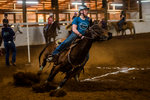
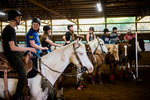
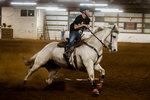
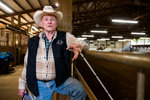
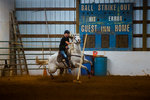
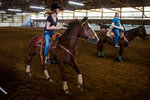
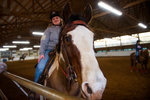
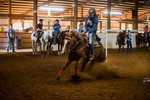
ADNA — Nearly every day, from September through June, the W.F. West equestrian team gathers their horses together so that their riders can saddle up and run their trusted companions through the official paces.
This season a total of 29 riders from eight area schools are coming together for those practices at a menagerie of dirt floor arenas in and around Lewis County. Sideways shafts of light dance with dust particles that cut across the confines of the arena as young riders compel their steeds to achieve ever greater levels of performance..
“The commitment is very intense,” said W.F. West coach Adam Kasper.
From his perfect curl cowboy hat down to his well-worn boots and his easy going demeanor around horses and riders alike, it is apparent that Kasper knows his way around the working end of a livestock trailer.
“I started coaching in 2009 when my youngest granddaughter started high school. She’s graduated, but I didn’t,” laughed Kasper.
That granddaughter, Morgan Flatt, serves as the gaming coach for the team these days and Stephane VonMoos acts as the team’s other assistant coach. Each year the W.F. West equestrian team forms much like a conglomerate rock with schools from all over the area contributing riders to the stable of jockeys. This year’s team has riders who hail from Chehalis, Centralia, Toledo, Winlock, Onalaska, Mossyrock, Napavine and Adna.
But, as Geology 101 teaches us, it's not simply the raw deposits in and of themselves that make a conglomerate rock strong. They must be forged under pressure.
“My philosophy is, if they want to ride, I’ll let them,” said Kasper, who has helped to grow the sport not only locally, but throughout the entirety of the state.
In addition to acting as head honcho for the W.F. West equestrian team Kasper also serves as the chairman of District 6 for the Washington High School Equestrian Teams organization. The other teams in District 6 provide the bulk of the competition for W.F. West each season and include contingents from Elma, Hockinson, Tumwater, Washougal and Hazen, which is a school located near Monroe. Other nearby schools who regularly field equestrian teams include Rochester and Castle Rock.
The first incarnation of horse-centric competition for Washington’s young equestrians began in 2000 when 11 pioneering girls from Southwest Washington co-opted with Oregon’s prep equestrian governing body. By 2002, participation had grown enough to warrant the creation of Washington’s very own governing body, the WASHET. In 2005 that fledgling organization expanded to three brackets and today there are around 730 riders participating in seven districts across the Evergreen State.
“We’ve just been growing from there,” said Kasper. “More kids hear about it. It’s amazing. These kids talk and all of them who are in 4H talk to their siblings. It’s primarily word of mouth.”
Each regular season consists of three district meets before qualifying riders advance to the state competition. This year state will be held out beyond the Wild Horses Monument in Moses Lake before the regional round takes place in Oregon.
Competitions are not for those weak in spirit or short on fortitude as they typically begin on Thursday evenings and extend into the afternoon on Sunday. Each rider is allowed to compete in up to five individual events, with no limit placed on the number of team competitions they can participate in. Events include performance riding, stock seat, hunt seat, showmanship, jumping, dressage, practical trail, in-hand trail, working pairs drill, ten-man drill team, gaming events, barrel racing, pole bending, keyhole race, two barrel flags, Canadian flags, and the cowboy arts of break away roping, steer daubing, and cow sorting.
Although prep equestrian participation has grown exponentially over the last 18 years it is still not technically classified as a sport in Washington. In any case, all W.F. West team members are eligible for varsity letters, even if they attend another school.
“W.F. West is very good about that. They treat it as a sport even though we are club. So they recognize us with varsity letter and end of the year awards banquets,” explained Kasper. “Unfortunately the WIAA does not consider equestrian to be a sport. It’s been lobbied but for whatever reason...who knows?”
Over the last few seasons the W.F. West team has done plenty to prove their competitive bonafides and burn their brand into the memories of anyone paying attention. Those efforts include at least three record-setting performances by W.F. West riders.
In 2016 Katelyn Buckman set the district record for pole bending with a time of 20.960 seconds during a contest in Tacoma. By comparison, the state record for that event is 20.764 seconds. Then, in 2018, Buckman set another district record with a time of 14.408 seconds in a barrels competition at Grays Harbor. The state record in that event is 14.304 seconds.
In 2017 it was Natalie Gluck who brought the biggest accolades back to the W.F. West barn by setting a state record of 20.764 seconds in the keyhole race event at a contest in Grant County.
Kasper noted that those razor thin margins force his horseback athletes to constantly focus on their craft, even as they practice seemingly on end for the first six months of the high school season.
“It’s a very small margin. You could lose a run by thousands of a second because we time to thousandths of a second,” Kasper noted. “Patience and consistency is key when working with a horse.”
While the W.F. West equestrian team is able to come together for practices at relatively local locations like the Rocky Top Arena in Salkum and Triple H Arena in Adna, they are currently precluded from hosting an actual competition.
“I have 130 kids in my district so I’d need at least 130 stalls. We just don’t have the facilities to do it. It sure would be nice if we could,” explainted Kasper.
W.F. West will begin their regular season competitions on Thursday when they truck and trailer their way down to the Grays Harbor County Fairgrounds in Elma for a district meet. Contests will begin Thursday evening and then resume between 7 a.m. and about 11:30 p.m. on Saturday. Sunday’s events will also begin at 7 a.m. with the intention of wrapping things up by about 2:30 p.m. so there’s enough time for riders and their families to pack up and get home in time to complete evening barn chores.
Kasper noted that most families camp out over the weekend and nearly everyone finds their way to the team dinners and team lunches.
“We couldn’t do it without thet parent support,” Kasper insisted. “Without parents these kids wouldn't have horses or a place to keep them. It’s not like basketball where you can just throw a ball in a cage, lock it up, and go home.”
With nearly 30 riders in camp this season Kasper is already pleased with the direction of his team, and the sport in general, even before the first official results have been logged. He noted that each season he returns to the dusty choked arena where he is able to witness the evolution of horses and riders alike, as well as the uniquely bonded relationship between the two.
“Of course it’s a labor of love. But what’s really rewarding is kids come in as freshman who are just green riders. But four years later, as seniors, they graduate as accomplished riders,” Kasper said. “That’s what it’s all about out here.”